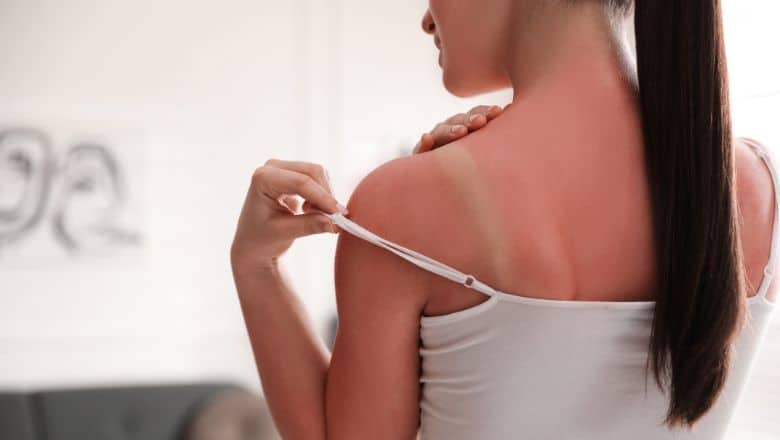Can You Use Olive Oil As a Sunscreen?
Olive Knowledge is a part of Amazon Associates. As an Amazon Associate, we earn from qualifying purchases. Read our Affiliate Disclosure to learn more.
I’ve heard people using olive oil as sunscreen at least a hundred times. And while that sounded great, I deeply researched all the pros and cons and decided to share my findings with you.
Key Takeaways:
- Olive oil is not recommended as a primary sun defense due to insufficient UV protection.
- Olive oil has a low SPF of 8, absorbing only about 20% of UV rays.
- Olive oil is beneficial for post-sun skincare, providing hydration and nourishment.
- Olive oil can soothe sunburns but is not a cure, aiding in the healing process.
- Dedicated sunscreens, designed for UV protection, are irreplaceable for sun safety.
Can You Use Olive Oil As a Sunscreen?

The simple answer is while you can, it’s not the best choice for your skin. Olive oil doesn’t provide enough UV protection. Despite its many benefits, it doesn’t have strong SPF properties, and as a seasoned olive oil producer, I don’t recommend using it as your primary sun defense.
Some beach-goers might apply olive oil for a quicker tan. However, without the necessary UV protection, you’re leaving your skin vulnerable to the harmful effects of the sun, including sunburns. It’s a risky game to play and one that I advise against.
Why Olive Oil Doesn’t Work As a Sunscreen
Olive oil doesn’t work as a sunscreen because it has a relatively low Sun Protection Factor (SPF). With an SPF of 8, olive oil only absorbs about 20% of UV rays. This means that a large proportion of harmful sun rays can still reach your skin, leading to potential damage.
SPF values are a measure of a sunscreen’s ability to prevent UVB from damaging the skin. To understand just how low an SPF of 8 is, let’s take a look at what’s recommended for proper sun protection. Dermatologists generally advise using sunscreen with an SPF of at least 30. This level of SPF blocks approx. 97% of UVB rays, offering much more protection than olive oil.
From my experience, applying olive oil can sometimes even attract more sun, intensifying its effect and increasing the risk of skin burns.
So, while it may be tempting to reach for that bottle of olive oil in the hope of natural sun protection, remember that it’s not equipped to shield your skin as effectively as a dedicated sunscreen product.
Olive Oil Post-Sun: Your Skin’s Best Friend

While olive oil may not make the cut as a sunscreen, it can indeed play a comforting role in post-sun skincare. After spending a day under the sun, your skin craves hydration and nourishment. This is where olive oil can step in to become your skin’s best friend.
Olive Oil for Hydration
Olive oil is rich in antioxidants and vitamins, and it’s known for its moisturizing properties. When you return from the beach, your skin might feel dry and tight. Applying olive oil can help replenish the moisture your skin has lost due to sun exposure. Its hydrating effect can leave your skin feeling soft and supple.
Olive Oil for Sunburns

Even with the best intentions, sunburns can occasionally happen. In my experience, olive oil can provide some relief. Its soothing properties can help calm the skin, reducing redness and inflammation. While it’s not a cure for sunburn, it can certainly contribute to the healing process.
For the best post-sun care, I highly recommend using St. John’s Wort Oil that’s made with olive oil. I use it every year for all kinds of purposes, and it’s a fantastic and healthy oil. Or, if you have some expired olive oil, don’t dispose of it. Instead, you can use it on your skin.
Always Use Dedicated Sunscreens
When it comes to sun protection, there’s no substitute for dedicated sunscreens. They are specifically designed to shield your skin from harmful UV rays and come in various options to cater to different skin types and preferences.

A great example is the Organic Olive Oil Natural Sunscreen from Malina. It’s a natural sunscreen made with non-nano zinc oxide combined with a blend of organic unrefined oils and butter, effectively protecting you from sunburn while moisturizing and nourishing your skin.
This sunscreen is infused with top-of-the-line extra virgin olive oil from California, ultra-high in polyphenols, giving your skin a luxurious feel and a delightful aroma reminiscent of a sunny olive grove. Importantly, it offers a natural SPF of 30 or 60, depending on the selected option, providing a more reliable level of protection compared to the natural SPF of 8 of pure olive oil.
A Few Extra Tips For Sunbathing
Here are a few tips for safe sunbathing that go beyond just applying sunscreen.
Timing is Key
- Avoid sunbathing in the middle of the day when the sun’s rays are the strongest, typically between 10 a.m. and 4 p.m. During these hours, UV rays are the most intense and can cause the most skin damage. Opt for early morning or late afternoon for safer sunbathing times.
Dress for Protection
- Wear sun-protective clothing whenever possible. This includes wide-brimmed hats to shield your face and neck, sunglasses to protect your eyes from harmful UV rays, and long-sleeved shirts and long pants made of tightly woven fabrics to protect your skin. Some clothing even comes with a UPF (Ultraviolet Protection Factor) rating, which can provide extra assurance of its sun-protective abilities.
Seek Shade
- When you’re at the beach or park, bring a parasol or sit under a tree during peak sun hours. This can provide you with a break from direct sunlight and reduce your exposure to UV rays.
Hydrate
- Drinking plenty of water is essential when you’re out in the sun. It can help replace the fluids lost due to sweating and prevent dehydration, which can sometimes lead to heat-related illnesses.
